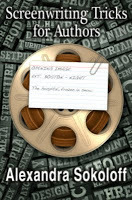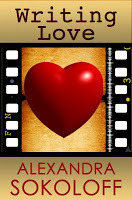Practicing story
I'm teaching this week, the one really intensive workshop I do all year, at the West Texas A&M Writers Academy.
Usually when I do a workshop it's a day-long interactive lecture that I give to a large class - sixty to several hundred people - in which I review the Three-Act, Eight Sequence Structure and other general film writing techniques that are invaluable for authors, and then start with Act I and go through all the story elements I talk about here and in the workbooks, one sequence at a time.
Which is a great overview, and I answer a lot of individual questions and use lots of examples, but it's by necessity a very general class.
At the Writers Academy, the class size is limited to fifteen people and we can go through everyone's stories one sequence at a time. I love being able to be hands-on (at least, for a limited time!) and it's really remarkable to see writers at very different levels and at very different points in the writing process pull their ideas into coherent, complete and exciting story outlines in just five days.
At first you can see some people in the class are so focused on their own stories that they don't pay any attention to the other writers as they talk about their stories - they just scribble notes on their own stories until it's their turn to talk. But by the third day or so it's starting to sink in that listening to OTHER people's stories, and brainstorming to solve SOMEONE ELSE'S story problem, is actually helping them become better writers. And you can see the lightbulbs go on - that it doesn't matter that other people in the class are writing in different genres - that story structure applies across the board, and comparing stories in different genres actually gives you a better understanding of your own genre.
I hope that the class shows people that to get good at telling stories you have to actively practice story structure, spitballing story problems, comparing story solutions. I hope it shows people that you have to fall in love with - not just writing, but STORY.
There's something about creativity that craves company, and feeds off the creativity of others. I know I get exponentially more writing done when I get together with my own writing group, The Weymouth Seven. I would meet with them every week, if we all actually lived in the same state. But even though we don't, we still make time and travel to meet up with each other for a week at a time, two or three times a year.
It seems to me that it's so worth the time to create and sustain a critique group. That's not an easy thing to do, I understand. Especially when you're a new writer, a bad critique group can do a lot more harm than good. But if you can find a group of dedicated people who have enough control over their own egos and insecurities to commit to creating the kind of atmosphere that encourages creativity, it can bring everyone's writing to a far higher level.
How about you guys? Good or bad experiences with critique groups? If you have one that works, how do you run it? Do you have a moderator, or do you use a particular writing method?
And if you don't have a critique group, how do YOU practice story?
- Alex
=====================================================
Screenwriting Tricks for Authors and Writing Love, Screenwriting Tricks for Authors, II, are now available in all e formats and as pdf files. Either book, any format, just $2.99.
 - Smashwords (includes pdf and online viewing)
- Smashwords (includes pdf and online viewing)
- Kindle
- Barnes &Noble/Nook
- Amazon UK
- Amaxon DE (Eur. 2.40)
 - Smashwords (includes online viewing and pdf file)
- Smashwords (includes online viewing and pdf file)
- Amazon/Kindle
- Barnes & Noble/Nook
- Amazon UK
- Amazon DE
-------------------------------------------------------------------

Usually when I do a workshop it's a day-long interactive lecture that I give to a large class - sixty to several hundred people - in which I review the Three-Act, Eight Sequence Structure and other general film writing techniques that are invaluable for authors, and then start with Act I and go through all the story elements I talk about here and in the workbooks, one sequence at a time.
Which is a great overview, and I answer a lot of individual questions and use lots of examples, but it's by necessity a very general class.
At the Writers Academy, the class size is limited to fifteen people and we can go through everyone's stories one sequence at a time. I love being able to be hands-on (at least, for a limited time!) and it's really remarkable to see writers at very different levels and at very different points in the writing process pull their ideas into coherent, complete and exciting story outlines in just five days.
At first you can see some people in the class are so focused on their own stories that they don't pay any attention to the other writers as they talk about their stories - they just scribble notes on their own stories until it's their turn to talk. But by the third day or so it's starting to sink in that listening to OTHER people's stories, and brainstorming to solve SOMEONE ELSE'S story problem, is actually helping them become better writers. And you can see the lightbulbs go on - that it doesn't matter that other people in the class are writing in different genres - that story structure applies across the board, and comparing stories in different genres actually gives you a better understanding of your own genre.
I hope that the class shows people that to get good at telling stories you have to actively practice story structure, spitballing story problems, comparing story solutions. I hope it shows people that you have to fall in love with - not just writing, but STORY.
There's something about creativity that craves company, and feeds off the creativity of others. I know I get exponentially more writing done when I get together with my own writing group, The Weymouth Seven. I would meet with them every week, if we all actually lived in the same state. But even though we don't, we still make time and travel to meet up with each other for a week at a time, two or three times a year.
It seems to me that it's so worth the time to create and sustain a critique group. That's not an easy thing to do, I understand. Especially when you're a new writer, a bad critique group can do a lot more harm than good. But if you can find a group of dedicated people who have enough control over their own egos and insecurities to commit to creating the kind of atmosphere that encourages creativity, it can bring everyone's writing to a far higher level.
How about you guys? Good or bad experiences with critique groups? If you have one that works, how do you run it? Do you have a moderator, or do you use a particular writing method?
And if you don't have a critique group, how do YOU practice story?
- Alex
=====================================================
Screenwriting Tricks for Authors and Writing Love, Screenwriting Tricks for Authors, II, are now available in all e formats and as pdf files. Either book, any format, just $2.99.
 - Smashwords (includes pdf and online viewing)
- Smashwords (includes pdf and online viewing)- Kindle
- Barnes &Noble/Nook
- Amazon UK
- Amaxon DE (Eur. 2.40)
 - Smashwords (includes online viewing and pdf file)
- Smashwords (includes online viewing and pdf file)- Amazon/Kindle
- Barnes & Noble/Nook
- Amazon UK
- Amazon DE
-------------------------------------------------------------------
Published on June 21, 2012 13:01
No comments have been added yet.



